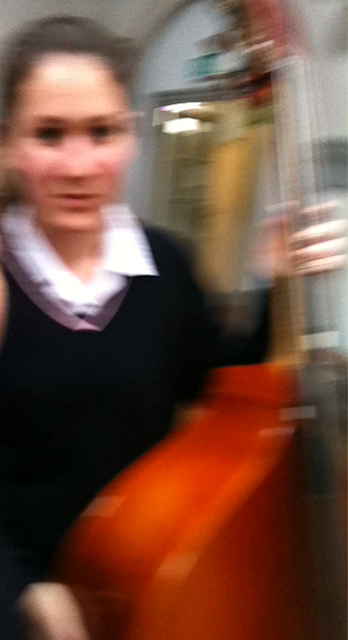I've always loved music. My very first memories of listening to music are singing away to Magic FM (the only station my parents would play when I was a kid) in the car and my dad playing old Portuguese cassettes in our living room on bright weekends. Unfortunately for my family, I thought I was an incredible singer and sang very often and very out-of-tune. Nonetheless, I joined my primary school choir as soon as I could and we won a national competition to perform in the Royal Albert Hall - I like to think this is what started off my musical career.
I've played four instruments in my life to varying degrees: at the age of 6 we were allowed to try out for the recorder and lo and behold, I was offered lessons. I went on to complete Grade 1 with Distinction and played in my primary school orchestra, before moving schools at the age of 10 where my recorder career was ended due to the fact that they didn't offer lessons at my new school. Nonetheless, I'd also been playing the violin since the age of 7 or 8, and so joined this school orchestra as a violinist instead. I got to first desk and remember achieving Grade 3 with Distinction, however when I started secondary school I realised that some of the kids had been playing since the age of 4 and therefore were much more advanced. I kept up the violin for a year or so, and played in the two lower-level school orchestras, however my violin teacher was very involved in the four school orchestras (two lower-level and two higher-level) and since there very few double bass players in my school and my hands were quite big, she suggested a free double bass lesson for me to try it out.

It wasn't only double basses that we lacked; in Year 7, I remember that the music department offered a free lesson for 4 different instruments, including the double bass, the oboe, and the bassoon, as not many people played them and many orchestral pieces rely on them. Initially, I was slightly put off by the size of the bass (which if you don't know, is essentially a massive cello) and the idea of going from Grade 3 Violin to starting from scratch, however my bass teacher was very relaxed and didn't force me to do grades, and I knew that I'd be able to progress much quicker through the different orchestras. I remember passing Grade 3 on the bass early on, but I wasn't too interested in learning exam pieces and scales and preferred to keep the lessons more enjoyable. My old violin teacher was extremely encouraging as she knew that for the next 7 years she had a bassist for the schools orchestras, and she even wrote parts for me at the very beginning in the lower level orchestras so that I didn't go from playing the violin in two orchestras to playing in none.
I'd also started piano lessons aged 10 when I moved to my second primary school, which I loved and I continued playing throughout my entire secondary school career, eventually achieving Grade 8 with Merit during my A Level exams. Over 8 years I only had two piano teachers (my primary school teacher and secondary school teacher), both of whom were extremely supportive and encouraging and made me fall in love with the instrument. It was one of the things I missed throughout uni and the nature of progressing through the grades taught me a lot about discipline and determination. On the other hand, my bass lessons were more relaxed and I could learn more fun pieces. I love both instruments but they both gave me very different things.
I struggled to give up the violin as I enjoyed playing it but I couldn't fit in three music instruments alongside academics and extracurriculars, and since I preferred the piano, the violin had to go. Plus, once you can play one stringed instrument, you can pick up another fairly quickly. All of the teachers in the music school loved the kids who played more unique instruments and definitely cut us some slack in orchestra. The two higher-level orchestras at school were generally for Grade 5 and over, however I got invited to both after only a year or two of playing the bass, and by Year 13 I was the lead bassist in two school orchestras, whilst playing in a school octet, a Foundation Schools orchestra (an orchestra made up of musicians from my school and two others which had the same founder), had performed in St John's Smith Square and the Royal Festival Hall, and had toured in Spain.
Although I really enjoy playing the piano, I think that being in an orchestra is such a beneficial experience. Some of my best friends were made in orchestras and the last music tour I went on provided some of my most-told stories nowadays. I came to see classical music in a completely different light and it taught me so much about music and musicians that most people don't know. When I go to the theatre I always get distracted by the musicians as I loved seeing the different sections play and you learn small things, from how different instruments sound, to where the leaders of each section sit, to what the conductors movements actually mean. When I think of leaving secondary school, it's actually my last concert that I think of, and how each leaver got given a rose to commemorate their time in the orchestra. You saw students develop from second violins in the lower orchestras to leaders of the higher-level orchestras, friends perform concertos, and found an appreciation for the different instruments. Similarly to sports clubs, I think that orchestras can be a great way for kids to develop many skills, such as teamwork, and socialise with others.

Apart from being able to advance much quicker than musicians who play very common instruments, the bass has many advantages:
1) I never had to carry it around as it would always be taken in a van to concert venues and instead of carrying one in from home I used the ones at school during music lessons or orchestra rehearsals.
2) It's one of the few instruments that is part of many different genres, including two of my favourites: jazz and classical. Although I love playing the piano, it's quite an individual hobby, whereas the bass allows you to be part of different groups, and therefore socialise more and make friends. Because so few people played the bass at my school, you immediately became good friends with those who did, despite them being several years above or below you.
3) You have a lot of variety in the pieces. The brass section is renowned for counting endlessly and then playing a couple of notes before repeating the cycle, and there are a few pieces where the basses suffer the same fate. Oftentimes we simply play a simpler version of what the cellists are playing, however every now and again we have our own technical parts and have to master the fingering and concentration required by other string and wind instruments. Additionally, we often keep the beat alongside the percussion. This makes it easy to build a rapport with different sections in the orchestra, especially if you are the lead of a section, as all of the leads have to keep time with each other (and the conductor, of course).
4) Compared to many other instruments, the bass produces a very pleasant sound. Obviously, this point is fairly subjective and for professionals it's less relevant, but my parents had to deal with hearing me learn to play four different instruments from scratch, and they will tell you that the bass was hands-down the least annoying at the start (it's safe to say the violin and recorder were the most).
5) Due to the size of the instrument, people start learning to play the bass later than other instruments so there's a certain humility and more camaraderie between bassists compared to more popular instruments in my experience.
6) Although many people have no idea what a double bass is the fingering is exactly the same as a bass guitar, so you can essentially play two instruments (I found this out when I was told I had to play the bass guitar in front of the whole school for an assembly despite never having touched one beforehand).
Of course, every instrument has its downsides, and apart from the obvious size of the bass, the main downside for me was that the bass' thick strings do hurt your fingers if you need to pluck a lot in a piece (and the fact that you need a special stool to play rather than any old chair). Nonetheless, I'd definitely recommend learning to play the bass if you're undecided (especially if you're a girl since it's so rare for girls to play the bass). Ideally, I'd end this post with some pictures of me playing the bass in my heyday, however I'm struggling to find any except the two poor-quality pictures below, so I'll leave you with those to enjoy instead.





Kommentare